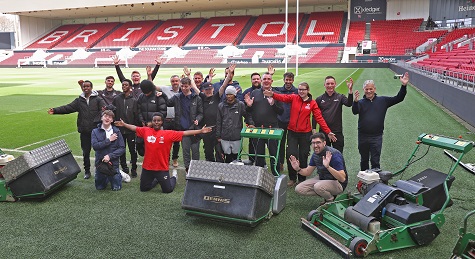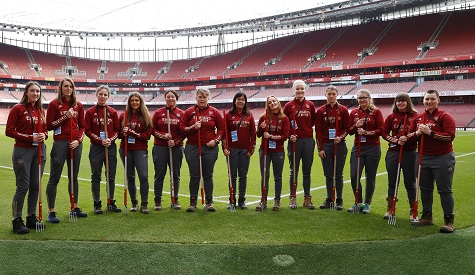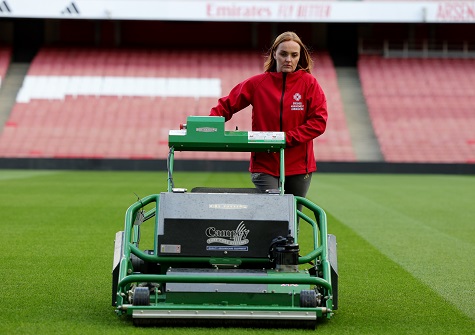
TurfPro editor, Laurence Gale, quite rightly asks two important questions in his recent blog post:
My view is that these points are related. Without greater awareness, understanding and respect of the work that grounds teams do, we’ll continue to struggle to improve work conditions and attract new talent in.
There’s undoubtedly more to do, but I know first-hand that a great deal of progress has been made. There are things to feel positive about.
Focussing on the next generation
One example is the GMA’s own NextGen initiative - formerly known as GMA Young Board of Directors. This is a brilliant group of young people who represent the grounds management industry to encourage more young people into the sector through targeted activity such as ‘Schools into Stadia’ and other events and campaigns.

This group is soon to engage with land-based colleges around apprenticeships and T-Levels to support the next generation of Grounds Managers.
Workforce development is at the heart of the GMA’s strategy, focussing on attracting new talent and accelerating the growth of a diverse workforce. We’ll do this by creating pathways for young people to enter the profession and providing training and development opportunities for existing staff.
See it, to be it
We’re also working to improve the culture within the industry by promoting diversity and inclusion. This involves addressing the underrepresentation of women and minorities in grounds management roles. We recently delivered a ‘Women in Grounds’ showcase in partnership with the WSL, Women in Football and Arsenal FC which saw 13 trailblazing women become the first all-female grounds team in football to prepare and maintain the iconic Emirates pitch.

As the saying goes, “you have to see it, to be it” – we need to let women and other underrepresented groups know that careers in grounds management are for them.
Recognition for professional expertise
The introduction of the Grounds Management Framework (GMF) was a pivotal moment for the sector. This sets out the national standards for natural turf across sports including Football, Cricket and both codes of Rugby. It was something the GMA led and many stakeholders, including NGBs and our members helped to shape.
For the first time it sets out a clearly defined pathway for progression in the sector, and clear development and lifelong learning opportunities for those employed or volunteering in grounds management.
The next stage of the GMF is aligning salary bands with each level of the framework so that grounds staff and their employers can understand what the appropriate salary would be in recognition of their professional expertise.

Working with the NGBs, our aim is to embed the GMF into the sports standards so that it becomes a key reference point which aligns pitch quality, experience, skills required and ultimately the associated salary for those maintaining that standard of pitch.
As we all know (and are sick of telling the outside world) we do more than mow. This is a professionalised sector and people should be supported to progress, and when they do, their pay should go up. It’s as simple as that.
Professional development is key
One vital thing grounds professionals can do themselves (and employers should support them), is build their skills and knowledge through training. There are lots of ways to do this. Of course, I’m going to plug the GMA’s resources because I think they’re brilliant and they’re also accredited by the Department for Education – ensuring the highest quality of information, advice and guidance.
There’s a range of online and face-to-face courses, as well as a suite of Professional Development qualifications – all supported by industry-leading tutors and designed to prepare people with the skills and knowledge to progress their career.
We’ve developed courses across major sports, including bowls, cricket, football, horse racing and both codes of rugby – covering everything from hybrid pitch maintenance to specialist subjects like warm season grasses, and fertilisers.
So far this year, more than 1,900 people have undertaken GMA training courses and qualifications, taking their careers to the next level. And to help with career planning, there’s the Training Needs Analysis Support – which can map out your professional and education journey.

Events like SALTEX and training courses offer physical venues for sharing best practice and further networking, which are crucial for industry growth.
I’d also direct people to the free resources available through the Grounds Management Toolkit.
Industry Representation
We are actively representing the interests of the grounds management industry at a national level with NGBs and Government. This includes advocating for better funding and investment in the sector, as well as raising awareness of the important role that grounds staff play in maintaining sports facilities and green spaces.
New things in the pipeline
We are launching a new jobs board which will not only list industry-relevant vacancies but provide free, useful content to those who may be looking for a job in the grounds care industry such as ‘how to’ guides, interview advice and guidance.
More to do
In answer to Laurence’s original questions, the answer is a huge yes. Grounds teams do deserve more respect, and there is more to do to solve the recruitment issues.
And the former, will help us address the latter.
But we mustn’t lose faith. When I think back to my first role in grounds management (longer ago than I like to admit) things have changed radically for the better. There is lots of good work being done across the sector, and much more to come.
Jason Booth has worked in the grounds care sector his whole career, from his early days at Yorkshire County Cricket Club and Leeds Rhinos to becoming chief operating officer at the GMA, a role which includes overseeing the delivery of the Pitch Advisory Service (PAS) as well as the GMA's Learning Department.